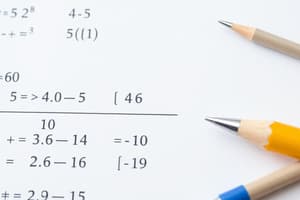Podcast
Questions and Answers
What is the correct formula for calculating percentage?
What is the correct formula for calculating percentage?
- Percentage = (Whole/Part) × 100
- Percentage = (Part/Whole) × 100 (correct)
- Percentage = (Part × Whole) / 100
- Percentage = (Whole - Part) × 100
Which of the following types of numbers does NOT belong to the number system?
Which of the following types of numbers does NOT belong to the number system?
- Imaginary numbers (correct)
- Whole numbers
- Rational numbers
- Integers
What is the area of a triangle with a base of 10 units and a height of 5 units?
What is the area of a triangle with a base of 10 units and a height of 5 units?
- 15 square units
- 25 square units (correct)
- 50 square units
- 30 square units
Which measure of central tendency is calculated by arranging values and finding the middle point?
Which measure of central tendency is calculated by arranging values and finding the middle point?
What common mistake can lead to errors in quantitative aptitude problems?
What common mistake can lead to errors in quantitative aptitude problems?
Flashcards are hidden until you start studying
Study Notes
Definition
- Quantitative Aptitude refers to the ability to understand, interpret, and analyze numerical data.
Key Areas
-
Number System
- Types: Whole numbers, integers, rational and irrational numbers.
- Concepts: Place value, operations (addition, subtraction, multiplication, division).
-
Arithmetic
- Topics: Percentages, Profit & Loss, Ratios & Proportions, Averages, Time & Work, Speed & Distance.
- Formulas:
- Percentage = (Part/Whole) × 100
- Profit = Selling Price - Cost Price
-
Algebra
- Concepts: Variables, equations, linear equations, quadratic equations.
- Important Formulas:
- Quadratic Formula: x = [-b ± √(b² - 4ac)] / 2a
-
Geometry
- Types: Lines, angles, triangles, quadrilaterals, circles.
- Key Formulas:
- Area of Triangle = 1/2 × base × height
- Circumference of Circle = 2πr
-
Statistics
- Measures: Mean, median, mode, range.
- Concepts: Data interpretation, frequency distribution, probability basics.
-
Data Interpretation
- Skills: Analyzing charts, graphs, and tables.
- Key Methods: Bar charts, pie charts, line graphs, and pictograms.
Test Taking Strategies
- Read questions carefully to understand what is being asked.
- Manage time effectively; allocate time based on question difficulty.
- Practice mental math to improve speed and accuracy.
- Familiarize yourself with common shortcuts and tricks.
Practice and Resources
- Solve previous year papers and practice quizzes.
- Use online platforms and apps for quantitative aptitude practice.
- Review and understand concepts through textbooks focused on aptitude.
Common Mistakes
- Misreading questions or overlooking key information.
- Failing to double-check calculations.
- Ignoring units of measurement.
Preparation Tips
- Regular practice to enhance speed and accuracy.
- Focus on weaker areas identified through practice tests.
- Group study to cover diverse problem types and solutions.
Quantitative Aptitude Definition
- Ability to understand, interpret, and analyze numerical data.
Number System
- Types include whole numbers, integers, rational and irrational numbers.
- Concepts include place value, operations like addition, subtraction, multiplication, and division.
Arithmetic
- Topics include percentages, profit & loss, ratios & proportions, averages, time & work, and speed & distance.
- Percentage formula: (Part/Whole) × 100
- Profit Formula: Selling Price - Cost Price
Algebra
- Concepts include variables, equations, linear equations, and quadratic equations.
- Quadratic Formula: x = [-b ± √(b² - 4ac)] / 2a
Geometry
- Types include lines, angles, triangles, quadrilaterals, and circles.
- Area of Triangle Formula: 1/2 × base × height
- Circumference of Circle Formula: 2πr
Statistics
- Measures include mean, median, mode, and range.
- Concepts include data interpretation, frequency distribution, and probability basics.
Data Interpretation
- Skills include analyzing charts, graphs, and tables.
- Key Methods include bar charts, pie charts, line graphs, and pictograms.
Test Taking Strategies
- Read questions carefully to understand the request.
- Manage time effectively and allocate time based on question difficulty.
- Practice mental math for speed and accuracy.
- Familiarize yourself with common shortcuts and tricks.
Practice and Resources
- Solve previous year papers and practice quizzes.
- Use online platforms and apps for quantitative aptitude practice.
- Review and understand concepts through textbooks focused on aptitude.
Common Mistakes
- Misreading questions or overlooking key information.
- Failing to double-check calculations.
- Ignoring units of measurement.
Preparation Tips
- Frequent practice to enhance speed and accuracy.
- Focus on weaker areas identified through practice tests.
- Group study to cover diverse problem types and solutions.
Studying That Suits You
Use AI to generate personalized quizzes and flashcards to suit your learning preferences.




